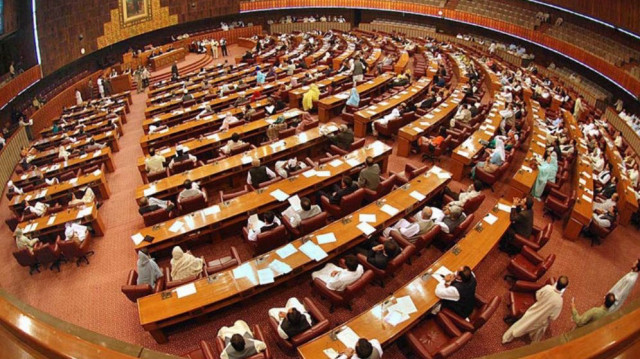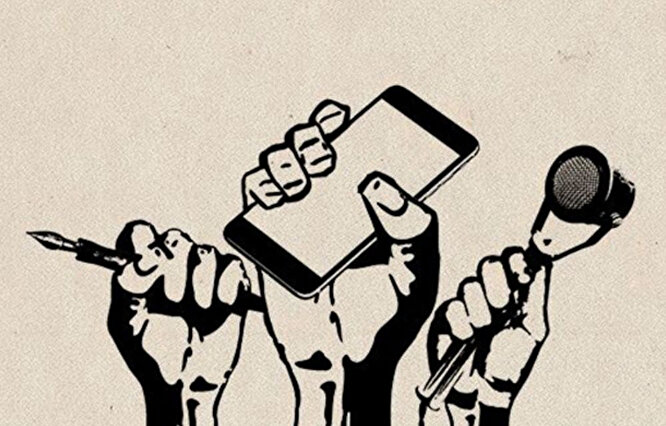
The controversial PECA Amendment Bill 2025 has been passed by the National Assembly, with provisions stating that any person found guilty of spreading "fake news" on social media could face up to three years in prison, a fine of up to 2 million rupees, or both.
The bill was passed on January 23, minutes after being introduced by Federal Minister for Industries and Production, Rana Tanveer Hussain, as opposition members had already walked out of the session. Journalists also boycotted the assembly session.
During the chaos in the National Assembly, Federal Information Minister Attaullah Tarar claimed that the bill was not against professional journalists but aimed at curbing the spread of fake news. Whereas, Journalistic organizations such as the Pakistan Federal Union of Journalists (PFUJ), the Association of Electronic Media Editors and News Directors, the All Pakistan Newspapers Society, the Council of Pakistan Newspaper Editors, and the Pakistan Broadcasters Association had already rejected the amendments to the bill. Members of political parties and representatives of organizations working on digital rights also expressed serious concerns about the bill.
The Secretary-General of the PFUJ, Arshad Ansari, stated that journalists would challenge these amendments in court, boycott assembly sessions, and protest against the bill. To understand why this bill is being protested, let us first examine the proposals put forth in the controversial bill.
The bill passed by the National Assembly is called The Prevention of Electronic Crimes (Amendment) Bill 2025. Here are some of the key amendments proposed in this bill:
The bill proposes the establishment of a Social Media Protection and Regulatory Authority, comprising nine members. This authority would regulate social media platforms and decide what content is permissible on social media.
The PECA Amendment Bill 2024 introduces a provision to establish a Social Media Complaints Council. This council will serve as a formal platform to address complaints from individuals who believe that specific online content breaches cybercrime laws. Its primary objective is to create an organized mechanism for resolving grievances related to unlawful or objectionable online material.
The bill suggests the establishment of a tribunal to handle cases related to online content. The tribunal would be required to resolve cases within 90 days, and its members would be appointed and removed by the federal government.
A new clause, Section 26(A), has been added to the PECA Act, stipulating punishments for those who deliberately spread fake news online that causes public panic, fear, or unrest. Such individuals could face up to three years in prison, a fine of up to 2 million rupees, or both.
The bill proposes dissolving the Federal Investigation Agency’s (FIA) Cybercrime Wing and transferring its responsibilities to a newly established National Cybercrime Investigation Agency. The federal government claims that the bill will help reduce fake news on social media, but the question remains: will it succeed?
While speaking to journalists at the Parliament's press gallery, Information Minister Attaullah Tarar said this is the first time that online platforms, information systems, mobile apps, and mobile websites are being brought under the scope of digital media regulations. He also mentioned that the Federal Investigation Agency (FIA) lacks the ability to handle crimes such as child exploitation and deepfakes.
Under the proposed rules, the Digital Rights Protection Authority will include one member from the journalist community. He explained that no action would be taken arbitrarily, as a written order would have to be issued within 24 hours of starting a case. If this order is not issued, the case would not proceed further. The minister emphasized that PECA does not include any provisions targeting working journalists. He assured them that the proposed law aims to protect their rights.

Journalist Umar Cheema, speaking to Yeni Safak Urdu, stated, "The bill lacks clarity. Typically, when a bill is introduced in the National Assembly, it is sent to the Standing Committee for review and consultation with stakeholders, but this was not done for this bill."
He added, "Many terms in the bill are vague, and it seems the purpose is not to combat fake news but to target those who question government policies or the policies of security institutions. There should be a clear distinction about what violations of the law are being addressed, but this bill lacks that clarity." Cheema further noted, "When there is absence of definition, the interpretation of the term falls into the hands of authorities, who will decide what is right and wrong. This is problematic."
He emphasized, "The proposal to impose a three-year prison sentence for spreading fake news should be reconsidered. The government should treat it as a civil offense rather than a criminal one. If someone spreads fake news, they should be fined or issued warnings multiple times, or their social media accounts should be blocked instead of sending them to jail."
Lawyer and human rights activist Reema Omer, speaking on a local private TV channel, remarked, "Four authorities have been proposed through amendments in this bill, but these authorities do not appear to involve any judicial oversight."
She added, "The authorities have been given excessive powers, and the question arises: how will these authorities independently determine what content is fake and what is not? The bill lacks mechanisms for scrutiny, raising concerns about transparency and justice."

Journalist and analyst Shehzad Iqbal commented, "The bill states that any content that stirs public emotions will be considered illegal. For instance, if a journalist points out a security lapse by agencies after an unfortunate incident, will that content be categorized as stirring public emotions against national security?"
He further questioned, "The proposed authorities will have all members appointed by the government. What guarantees are there that these members will make independent decisions? Or will this law only be used against political opponents?"
In a statement to Yenisafak Urdu, Babu Ram Pant, Deputy Regional Director of Campaigns for South Asia at Amnesty International, criticized the recent changes to Pakistan's Prevention of Electronic Crimes Act (PECA), approved by the National Assembly. Pant warned that if these amendments pass through both houses of Parliament, they will further restrict online freedom in Pakistan, where digital spaces are already tightly controlled.
The changes make sharing "false or fake information" a criminal offense, punishable by up to three years in prison and a fine. Pant highlighted that the vague language, combined with PECA's history of silencing critics, could discourage people from expressing opinions online.
Amnesty International urges the authorities to withdraw the Bill and engage with civil society to amend PECA in line with international human rights standards.
Journalistic organizations have rejected the bill and announced nationwide protests. The Joint Action Committee of journalist organizations stated in its declaration that the government violated its promises by passing the controversial bill without consultation. Stakeholders were supposed to be consulted, but that did not happen.
The declaration stated that the purpose of the PECA Amendment Bill is not only to target social media but also the digital platforms of electronic and print media, aiming to criminalize dissent.
The Joint Action Committee's declaration further announced that consultations with lawyers have begun to challenge the bill in court, and a legal case will soon be filed.
Hello, the comments you share on our site are a valuable resource for other users. Please respect other users and different opinions. Do not use rude, offensive, derogatory, or discriminatory language.
The floor is all yours.








